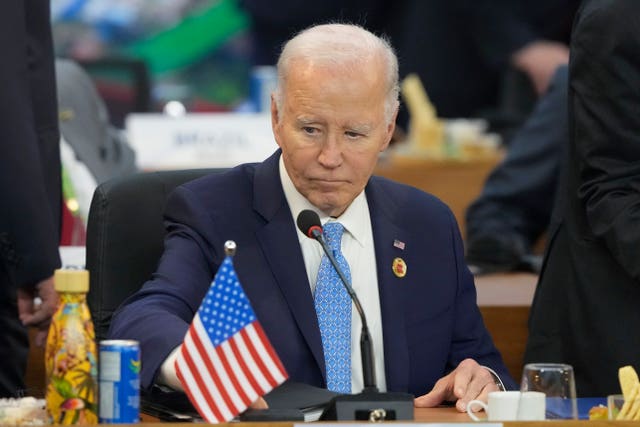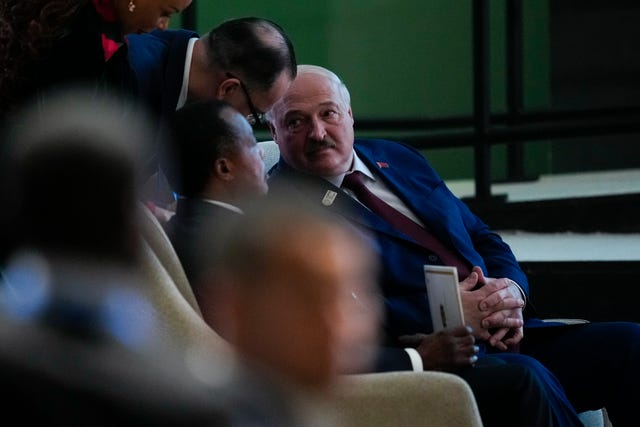Russian President Vladimir Putin has signed a revised nuclear doctrine declaring that a conventional attack on Russia by any nation that is supported by a nuclear power will be considered a joint attack on his country.
Mr Putin’s endorsement of the new nuclear deterrent policy comes on the 1,000th day after he sent troops into Ukraine on February 24 2022.
It follows US President Joe Biden’s decision to let Ukraine strike targets inside Russia with US-supplied longer-range missiles.
The signing of the doctrine, which says that any massive aerial attack on Russia could trigger a nuclear response, reflects Mr Putin’s readiness to threaten use of the country’s nuclear arsenal to force the West to back down as Moscow presses a slow-moving offensive in Ukraine.

Asked whether the updated doctrine was deliberately issued on the heels of the US decision to ease restrictions on Ukraine using its longer-range missiles to strike Russia, Kremlin spokesperson Dmitry Peskov said the document was published “in a timely manner” and that Mr Putin instructed the government to update it earlier this year so that it was “in line with the current situation”.
Mr Putin first announced changes in the nuclear doctrine in September, when he chaired a meeting discussing the proposed revisions.
The new version of the document states that an attack against his country by a non-nuclear power with the “participation or support of a nuclear power” will be seen as their “joint attack on the Russian Federation”.
It does not specify whether such an attack would necessarily trigger a nuclear response.
It mentions the “uncertainty of scale, time and place of possible use of nuclear deterrent” among the key principles of the nuclear deterrence.

At the same time, it spells out conditions for using nuclear weapons in greater detail compared to the previous version of the doctrine, noting they could be used in case of a massive air attack involving ballistic and cruise missiles, aircraft, drones and other flying vehicles.
The wide formulation appears to significantly broaden the triggers for possible nuclear weapons-use compared with the previous version of the document, which stated that Russia could tap its atomic arsenal if “reliable information is received about the launch of ballistic missiles targeting the territory of Russia or its allies”.
The revised doctrine envisages that Russia could use nuclear weapons in response to aggression against its ally Belarus.
Belarus’s authoritarian president Alexander Lukashenko, who has ruled the country for more than 30 years, has relied on Russian subsidies and support. He has let Russia use his country’s territory to send troops into Ukraine and allowed the Kremlin to deploy some of its tactical nuclear weapons in Belarus.
Since Mr Putin sent troops into Ukraine, he and other Russian voices have frequently threatened the West with Russia’s nuclear arsenal to discourage it from ramping up support for Kyiv.
Russian hawks have been calling for the doctrine to be toughened for months, arguing that the previous version failed to deter the West from increasing its aid to Ukraine and created the impression that Moscow would not resort to nuclear weapons.




Why are you making commenting on The National only available to subscribers?
We know there are thousands of National readers who want to debate, argue and go back and forth in the comments section of our stories. We’ve got the most informed readers in Scotland, asking each other the big questions about the future of our country.
Unfortunately, though, these important debates are being spoiled by a vocal minority of trolls who aren’t really interested in the issues, try to derail the conversations, register under fake names, and post vile abuse.
So that’s why we’ve decided to make the ability to comment only available to our paying subscribers. That way, all the trolls who post abuse on our website will have to pay if they want to join the debate – and risk a permanent ban from the account that they subscribe with.
The conversation will go back to what it should be about – people who care passionately about the issues, but disagree constructively on what we should do about them. Let’s get that debate started!
Callum Baird, Editor of The National
Comments: Our rules
We want our comments to be a lively and valuable part of our community - a place where readers can debate and engage with the most important local issues. The ability to comment on our stories is a privilege, not a right, however, and that privilege may be withdrawn if it is abused or misused.
Please report any comments that break our rules.
Read the rules hereLast Updated:
Report this comment Cancel